What Do Goats Eat? How to Feed Your Goats
Before buying goats, you should ask yourself: What do goats eat? Fortunately, they are one of the least picky ruminants that you can have on your farm, although they do require a balanced diet, just like humans do.
Goats are known to eat anything and everything. Still, as their owner, it is your responsibility to ensure they are consuming enough proteins, vitamins, and minerals depending on their age, breed, and size. You want to be sure when they are out browsing and foraging that they don’t eat any vegetation sprayed with insecticides.
Learn the best tips for feeding your goats as well as what to feed them to ensure they grow up to be healthy, productive animals.
What Do Goats Eat?
When you start buying feed for your goats, you’ll undoubtedly want to consider what they like to eat, as some owners find their animals will eat relatively anything. In contrast, others note that their goats are particularly picky eaters.
Often, you might have to try different types of food to figure out what ingredients will not only satiate your goats but also entice them to establish healthy eating patterns.
There are a multitude of things that you can feed goats. There are five essential nutrients goats need: water, energy (fat and carbohydrates), protein, minerals, and vitamins. A deficiency in any of these can cause illness, poor performance or growth, and even death.
Whether you’re looking for variety or if you want a more economical version to lessen your operating costs, choose from the following.
One of the most important things to have on your farm for any animal is hay. It is an essential resource that can also be a substantial source of nutrition for your goats, especially if they don’t tend to forage.
The distribution of hay will depend on the size of your property and whether you can set up a pasture for your new animals. Goats are fabulous grazers and might not require hay if they can forage throughout the year.
If you live in an area with changing seasons, with snow in the winter for example, this will prevent your goats from grazing. Therefore, you will want to invest in a substantial amount of hay.
Although there are many different types of hay, the essential thing to think about is the quality of what you’re feeding your goat compared to the specific version.
On average, goats require up to 14% crude protein and up to 65% TDN to maintain a healthy amount of microbes. These microbes make their meat and dairy safe for humans to ingest, so ensure you take the time to find the highest quality hay in your area.
Chaffhaye
Hay is the foundation of your goat’s diet if they aren’t able to forage. However, it’s also not filled with the essential vitamins and minerals they require to thrive. This is where Chaffhaye comes into play. Made from premature grass or alfalfa, depending on the type you find, this feed is combined with molasses.
It is then vacuum-sealed in a container, bag, or pouch to enable the production of healthy bacteria.
As the Chaffhaye begins to ferment, bacteria will grow in more substantial quantities. This helps to make your goat’s hay substantially easier on their stomach.
What’s more, it provides goats with an assortment of minerals and nutrients that their bodies will convert into energy.
Considering one of the most vital parts of owning goats is to ensure their digestive health, Chaffhaye is a fantastic option for maintaining their gut health with healthy bacteria.
Feeding Grain
Another essential part of a goat’s diet is grain. Feeding grain comes in many different forms and is one of the more affordable types of goat feed. If you’re asking, what do goats like to eat, feeding grain is often seen as a delicious and sweet treat. It also nourishes their digestive system and helps you to add more bulk to their meals.
You’ll find that most grains have an assortment of minerals and vitamins, as well as protein, that you can combine with hay to make their food far more nutritious. This is especially true if you can find grains that are specially formulated for goats.
There are four main types of feeding grain that you can find:
Whole Grain
This feed is unprocessed and will be available in an entire seed that your goats will love to chew. Whole grain feeding has several advantages. It can improve growth rate and feed efficiency.
Pelleted Grain
Most often, the pelleted grain is made from grain by-products that are cut into smaller pieces and bound together using a binding agent.
Rolled Grain
You’ll find rolled grain is quite similar in nutrition as whole grain, but instead of having pellets or rounded pieces, it is made flat.
Texturized Grain
If you need a type of feed with added ingredients for better nutrition, texturized grain is a fantastic option. You can easily combine it with other types of feed too. Learn what to feed goats to gain weight.
Kitchen Scraps
Even though it might seem easy enough to give your goats all of your kitchen scraps instead of putting them in the compost, you will want to establish a well-rounded diet of other ingredients apart from human food.
Goats will adore kitchen scraps as treats. However, they should always be combined with other goat-friendly ingredients, such as Chaffhaye, hay, or grain feed.
Mostly anything you would put into your compost will be sufficient enough for your goats, including tomatoes, orange peels, vegetable skins, and fruit skins.
There are a few ingredients that your goats can’t eat, such as eggshells and fish cuttings.
Grazing, Foraging and Browsing
Ideally, every goat farm should have enough area for the goats to graze throughout most seasons. This is why you will want to consider developing a pasture. Not only is this a more cost-effective way to make sure your goats are maintaining a healthy diet, but it can also be far more convenient and time-saving.
With a perfectly designed pasture, your goats can eat food freely instead of having to wait for specific feeding times. You can also use other ingredients as supplementary types of feed.
When developing your pasture, you’ll want to focus primarily on natural foods that are highly digestible and tasty to your goats. Otherwise, they aren’t likely to eat anything.
Sudanese and Bahia grasses are a fantastic option as well as clover, sorghum, millet, and grain grass. They not only boost your goat’s health but also grow quite well over the years.
One of the most substantial benefits to having a well-established pasture is that as your goats eat, their digestive systems will become less prone to internal parasites and gastrointestinal diseases.
Certain goat breeds, such as Kiko goats, are low maintenance and are excellent foragers. Likewise, a Toggenburg goat will rely less on supplemental feeding, resulting in a good ROI.
What Nutrients Do Goats Need?
Aside from asking what do goats like to eat, you should also find out their nutrient requirements. Just like any other animal you have on your farm, goats require an ample amount of nutrition to stay healthy and to live as long as possible.
There is an assortment of nutrients that they will need from their food, which is why opting for feed designed explicitly for goats is your best option. Also, it’s important to consider special circumstances. As example, a pregnant or nursing doe will have different dietary needs than a buck.
In general, you will want to ensure they’re consuming enough calcium, salt, and phosphorus daily in terms of minerals with the addition of Vitamin A, D, and E.
How to know if goats have the right nutrition
Signs of a good diet and the proper nutrition for goats include:
- Rapid growth
- High reproductive success
- Normal manure
- Good body condition
- High milk production
- Alert behavior
Goats that are hungry or unsatisfied will eat continuously. They won’t chew cud, play, or rest.
What Not to Feed Goats
Now that you have a clear idea of the best ingredients you can use to develop a healthier diet for your animals, it’s time to consider what not to feed goats.
It’s common to hear that these animals will eat anything, and in most cases, they will. This can also be incredibly hazardous to their health.
Be aware of areas on your property that may have been sprayed with insecticide or herbicides. Watch for trash and other discards. Some farm owners have suggested their goats might even be attracted to cigarette butts, which can be very toxic and dangerous.
Not only will you want to make sure you regularly inspect their pasture for harmful items, but you should also pay close attention to the food they are given.
Also, there are certain types of feed for other animals that should be avoided, as goats have sensitive digestive tracts that are prone to damage. Some of the most important things to keep out of your goat’s food include:
- Kale
- Holly trees and bushes
- Avocado
- Azaleas
- Milkweed
- Wild cherries
- Peach and palm leaves
- Nightshade vegetables
- Rhubarb leaves
- Chocolate
- Meat
- Dairy
- Crotalaria
- Dog food
- Cat food
Other things you shouldn’t feed goats include:
Dairy and Meat Products
Interestingly enough, goats are herbivores with a digestive system that is specifically designed to take advantage of cellulose within plants. In most cases, goats will stray away from meat and dairy products as it is in their nature not to be carnivorous.
However, if given the opportunity, they might nibble on meat, which can be harmful to their health. With a digestive system that is designed quite differently from carnivores and omnivores, goats are prone to severe health issues if they are ever fed meat or dairy, frequently leading to death.
This is why you should never feed your goats dog or cat food, as both will contain meat products or by-products that would internally damage your animals.
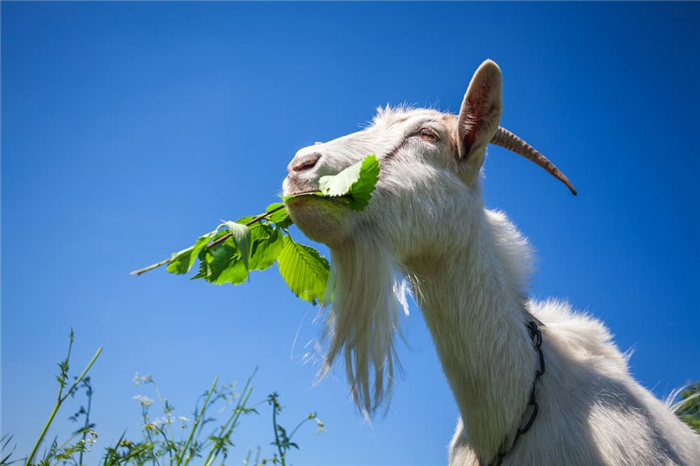
It’s important to know what to feed goats.
Non-Food Ingredients
As earlier mentioned, goats are naturally curious creatures. Hence, they are likely to nibble on items that might not even be classified as food, such as paper or cigarette butts.
The main reason as to why you should always inspect your goat’s enclosure and feed for non-food items is that these components can contain toxic chemicals, such as the ink used to print on paper, that could destroy their internal system.
It might seem like common sense, but there have been cases where goats have died as a result of being exposed to non-food household trash items in their food.
Poisonous Plants
When you establish pasture for your goats, you might assume that only the items you plant will be what grows in the area.
However, they can be exposed to other plants that make their way in. For example, yew, azalea, and rhododendron could be growing in the pasture unbeknownst to you. These are highly toxic plants that have a high likelihood of putting your goats at extreme risk.
While inspecting their browsing and grazing area for non-food items, take note of the plant life that they might have access to, as well, ensuring that you remove them as quickly as possible.
It is also a good idea to carry a sufficient amount of antidotes, should your goats get exposed to poisonous ingredients. Also, have the number of an emergency veterinarian at arm’s reach, if possible.
Food Supplements for Goats
Many first-time goat owners wonder if supplements are on the list of what can goats not eat when in reality, they are a fantastic addition to their diet. Similar to other animals, supplements are specifically designed to ensure your goats receive all of their essential vitamins and minerals.
You’ll find the majority of supplements are designed to be incredibly delicious while packed with nutrients. As such, your goats will love eating them regularly or as a treat at the end of the week.
Loose Minerals
Loose minerals are a multivitamin for goats. They typically contain a substantial amount of minerals and vitamins which will aid in goats’ digestive health.
You should be able to find them in blocks in which goats can lick over time. You can also buy them as loose powders or granules you can add to their food. The ingredients in loose minerals are easily fed free choice. They contain chelated minerals that are easily absorbed by the internal system of your animals and utilized effortlessly.
Black Oil Sunflower Seeds
This treat is well-known among rabbit owners because they are delicious and nutritious. Did you know that it can also be a fantastic supplement to add to your goat’s food? Black oil sunflower seeds feature an incredible amount of vitamin E, which is essential for the healthy development of muscles and reproduction in your goats.
Farm owners will also love that black oil sunflower seeds contain an ample amount of selenium, iron, and zinc for internal and external health.
Feeding goats black oil sunflower seeds is a way to supplement to enrich the fat content in your goat’s milk while ensuring their coats remain shiny and healthy. It’s one of the best supplements to use.
Apple Cider Vinegar Solution
You can easily buy pre-mixed apple cider vinegar solutions for barn animals. In addition, you can use a DIY recipe to make your own. Either way, it’s a great way to promote a healthier immune system in your goats.
Some goat breeds are particularly susceptible to diseases and illnesses, which can easily be warded off with a healthier immune system.
By adding this solution to their water daily, you’ll be increasing the total number of enzymes in their body. You’d also be adding minerals that can help them fight off the most common illnesses among goats.
Tips for Feeding Goats
Now that you know what can’t goats eat, let’s get into the details of how you can help to make feeding time substantially easier. There are many fantastic tips and tricks that farm owners use to their advantage to ensure their goats are eating healthy amounts of food regularly.
Find Feeding Equipment
You don’t need to spend thousands of dollars to feed your goats, which is convenient. However, you will still need a few essentials to protect the integrity of their food. Doing so will also make feeding goats much more manageable.
Depending on how you feed your goats, you might find some of these items aren’t essential. However, they are all useful for first-time owners.
Feed Storage Containers
Do not underestimate proper feed storage containers. Having the right containers makes it easy to keep goat’s food fresh and safe from pests and mold.
Food Buckets
Food buckets can be convenient if you are hand feeding or spreading feed around the enclosure. You might also allow your goats to eat directly out of the buckets.
Water Buckets
By using a plastic bucket, you can be sure to adequately disinfect it. In this way, goats always have access to clean water.
Hay Manger
This may be the most expensive item on this list. A hay manger makes it much easier to feed your goats hay that might be mixed with other ingredients, such as alfalfa. Your goats will be able to feed themselves.
Slowly Make Diet Changes
You may find that your goats lack a specific vitamin or mineral. If you want to add a new ingredient to a goat’s diet, be sure to do so slowly.
Goats digestive tracts are sensitive. Changing their feed drastically could result in a loss of appetite, illness, and gastrointestinal discomfort.
You will want to slowly introduce any new ingredients. Feed them small-to-moderate amounts of the new food over time until the goats become used to their diet.
Can goats eat dog food?
When asking what can goats not eat, dog food is number one on the list. It contains meat; goats are herbivores. Introducing meat-based foods, such as dog food, can cause illness and death in many cases. Manufacturers design dog food for canines who have different needs from goats.
Is bread good for goats?
Bread can be a fantastic treat for your goats. However, you should give it in moderation, just like any other treat.
Too much bread can cause bloating. It also contains carbohydrates which temporarily satiates your goats. This can make them hungrier by the end of the day.
You will also want to make sure you feed them small pieces of bread rather than whole slices. This will make it easier for their bodies to digest.
Can goats eat banana peel?
Fortunately, banana peels aren’t on the list of what can’t goats eat. Goats love to indulge in a variety of different fruit and vegetable skins.
You’ll especially love that banana peels aren’t an empty ingredient to add to their feed. In fact, they provide an essential amount of protein to help supplement their existing diet.
What vegetables can goats eat?
Goats can eat an assortment of vegetables, though their favorites are tomatoes, lettuce, spinach, celery, and carrots.
Is feeding meat goats expensive?
It’s important to know that profitable meat goat production requires high quality forage and browse as well as concentrate feeds.
Meat goats do not fatten like sheep or cattle. This means their rates of weight gain are smaller, ranging from 0.1 to 0.8 lb/day. Feeding is often the most expensive part when raising goats for meat. It’s important to allow them to graze whenever possible for optimum nutrients.
What Do Goats Eat? Just about Everything
If you’ve ever wondered what do goats eat, this is an extensive list, especially if your goats are the type to eat relatively anything.
By taking special care of their diets, you can make sure your goats have the right vitamins and minerals. A proper goat diet will sustain them as well as promote a healthy and happy life.
In addition, a well-balanced diet also helps to ensure they produce more delicious milk and meat.
How to Feed and Tend Goats on the Small Farm
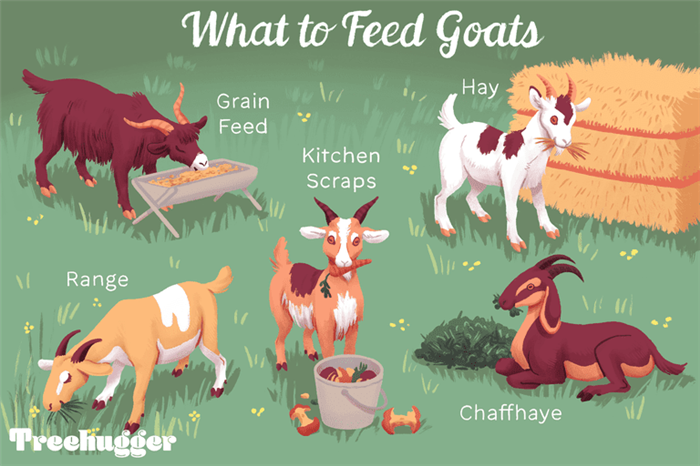
If you’re starting a goat herd, you will know that goats require some knowledge to feed them right. Whether raising goats for meat, establishing a dairy herd, or just practicing sustainable living on your homestead, goats need attention to their nutrition to thrive.
One good rule of thumb: don’t make drastic changes to your goats’ diet all at once. Don’t feed them large amounts of new food. Either of these practices can lead to a major digestive upset for your goats. Change their diets slowly, giving the bacteria in their rumen (their first stomach, made for the initial step in the digestion of the plants they eat) time to adjust.
Range: Browsing and Pasturing Goats
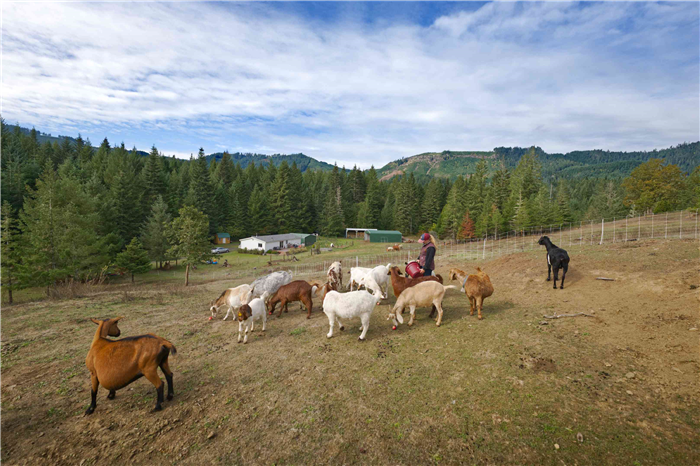
Treehugger / Dan Amos
Goats are well-known for their ability to pasture on anything from lovely green grass to scrubby woods, where they can eat young trees and hardy shrubs. They are browsers versus grazers (for example, cattle, sheep, and horses are grazing species). For this reason, they are excellent at clearing rough, overgrown land.
Let go of the myth, if you’ve heard it, that goats make good “lawnmowers.” They would prefer to browse if given a choice.
Goats are ruminants, animals who eat plants and digest them through a four-compartment stomach. However, they are more like deer regarding nutrition than they are to sheep or cattle, which eat lots of grass. In fact, goats should not eat a diet of entirely fresh grass.
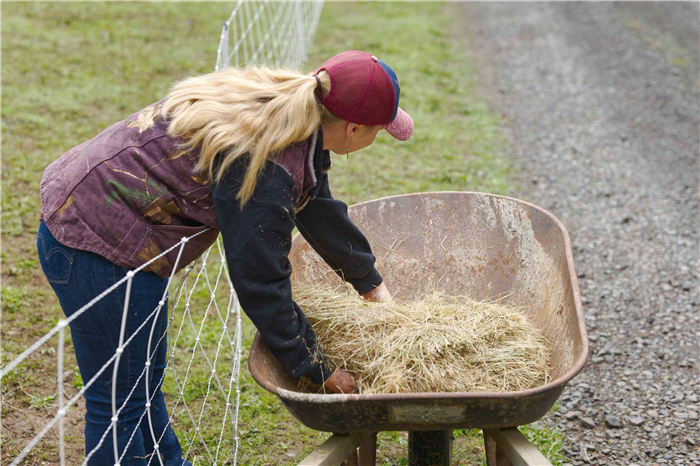
Treehugger / Dan Amos
Hay is the main source of nutrients for goats apart from their range. It’s what they mostly eat in the winter when they don’t have access to the range. Hay can be grass or a legume, like clover or alfalfa.
Each goat needs about two to four pounds of hay per day, minus what they might forage on pasture. Hay can be fed freely, or strictly twice a day.
If a good range isn’t available, dry grass hay of a horse quality is acceptable. Goats require additional hay, which is roughage, for their rumen to function properly. The long fiber is necessary for this. The rumen is the first stomach compartment, rich in live bacteria, that begins to digest the fiber. A healthy goat has a large rumen that feels spongy.
Alfalfa hay is also popular for feeding goats and has more protein, vitamins, and minerals than grass hays, typically. It can be a good choice for feeding milkers as it has more calcium as well.
Chaffhaye
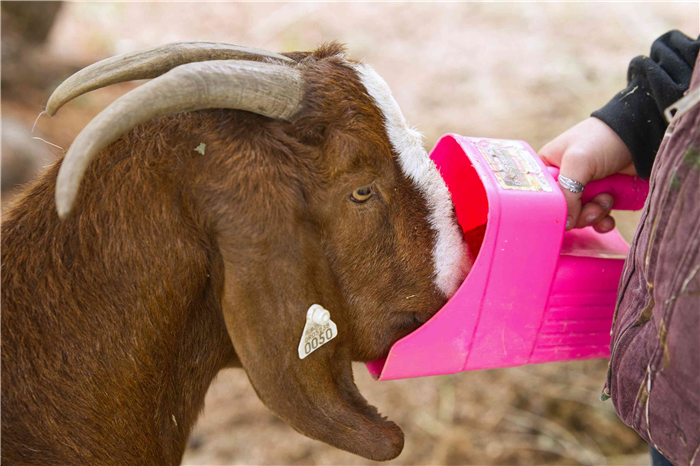
Treehugger / Dan Amos
Chaffhaye is made by cutting early alfalfa or grass, chopping it, mixing it with molasses and a probiotic culture called bacillus subtilis and vacuum-packing it. The hay ferments in the container, adding beneficial bacteria for the goats’ rumens. Chaffhaye can be fed as a hay alternative, with more nutrient density than hay. One 50-pound bag of chaffhaye equals roughly 85 to 100 lb of hay.
Grain Feed
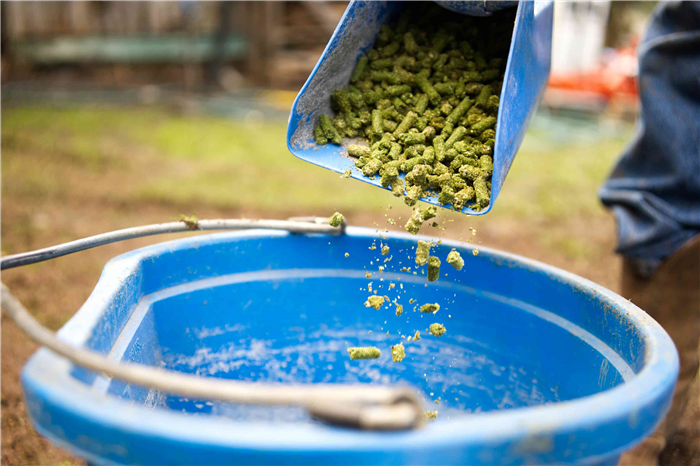
Treehugger / Dan Amos
Grain feed or pelleted grain mix can add protein, vitamins, and minerals to your goats’ diet. Most farmers supplement with grain feed when necessary—such as does who are raising multiple kids or in bad weather—but foraging and browsing is the foundation of good goat nutrition. Grain should not be overfed: it can make goats fat, cause illness and even death.
Some goat farmers like to have a livestock nutritionist formulate a goat pellet for use when supplements are needed. The local livestock nutritionist can tailor the feed to your area conditions, minimizing problems. You can also have your hay tested to add to the information that your livestock nutritionist will use for formulating this feed.
Minerals
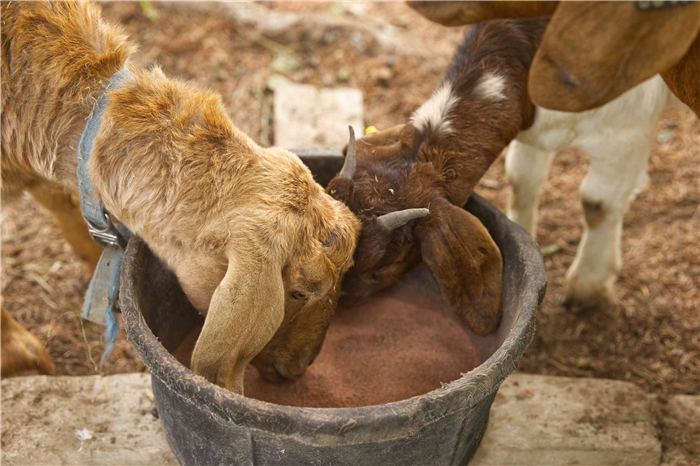
Treehugger / Dan Amos
Loose minerals formulated for goats should be offered free choice. Feed minerals individually, not in blocks that contain combinations of them.
Kitchen and Garden Scraps
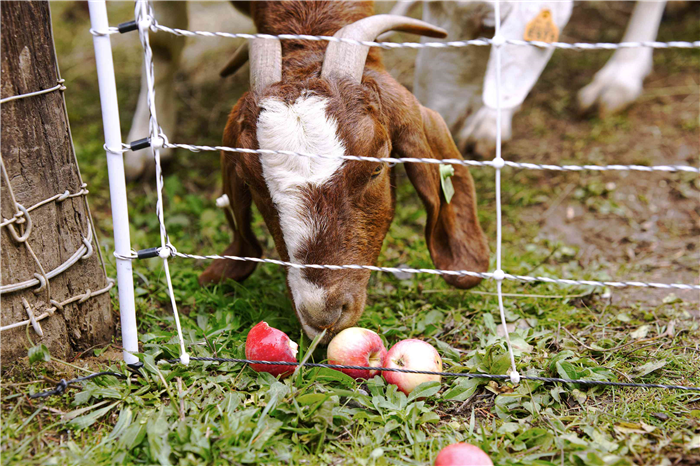
Treehugger / Dan Amos
Goats will do fine eating your compost, for the most part. Egg shells can be problematic, but most other basic kitchen and garden compost is fine for goats as long as they’re used to it.
Raisins and corn chips, just a few, or a slice of bread, make nice “treats” for goats but don’t overdo them.
Feeding Equipment
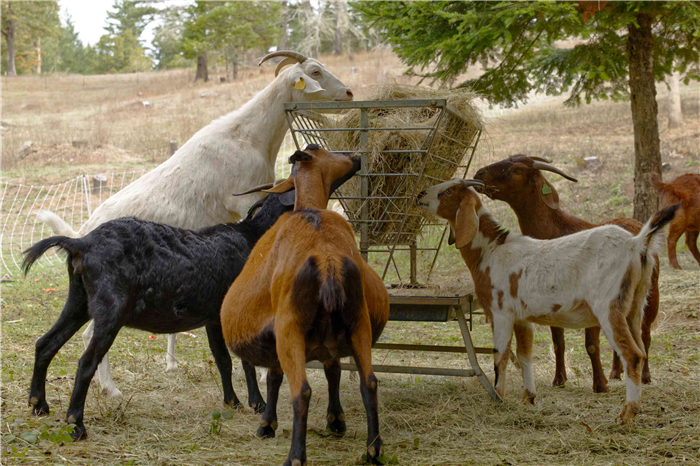
Treehugger / Dan Amos
You will also need some equipment for feeding your goats. Nothing fancy, but storing hay in a manger will help goats access it and waste less. And food containers or buckets will also help reduce waste. Metal or plastic feed storage containers with tight-fitting lids will keep pests out of your feed.
For your goats you may need:
- Feed storage containers
- Food buckets
- Water buckets
- Hay manger
- Mineral feeder
Water
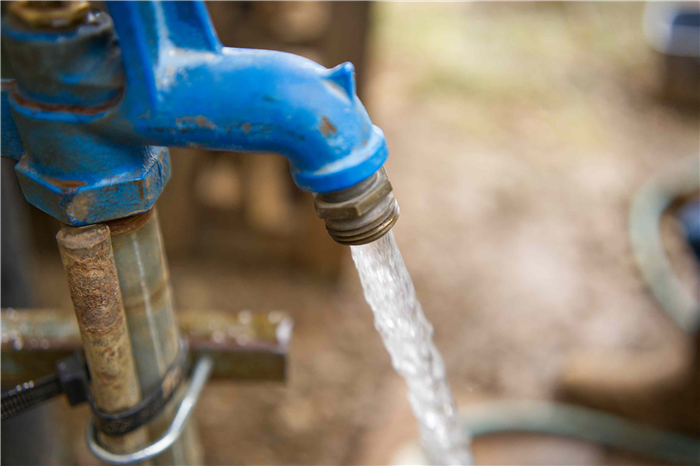
Treehugger / Dan Amos
Of course, your goats need access to fresh, clean water at all times. You may want to raise your water bucket off the ground onto a platform or in an old tire, so it’s less likely to get kicked over or pooped in. In winter, you will need to use a water heater so that your goats’ water isn’t freezing cold and doesn’t turn to ice.
Essential Things You Need To Know About Feeding Goats
Jennifer is a full-time homesteader who started her journey in the foothills of North Carolina in 2010. Currently, she spends her days gardening, caring for her orchard and vineyard, raising chickens, ducks, goats, and bees. Jennifer is an avid canner who provides almost all food for her family needs. She enjoys working on DIY remodeling projects to bring beauty to her homestead in her spare times.
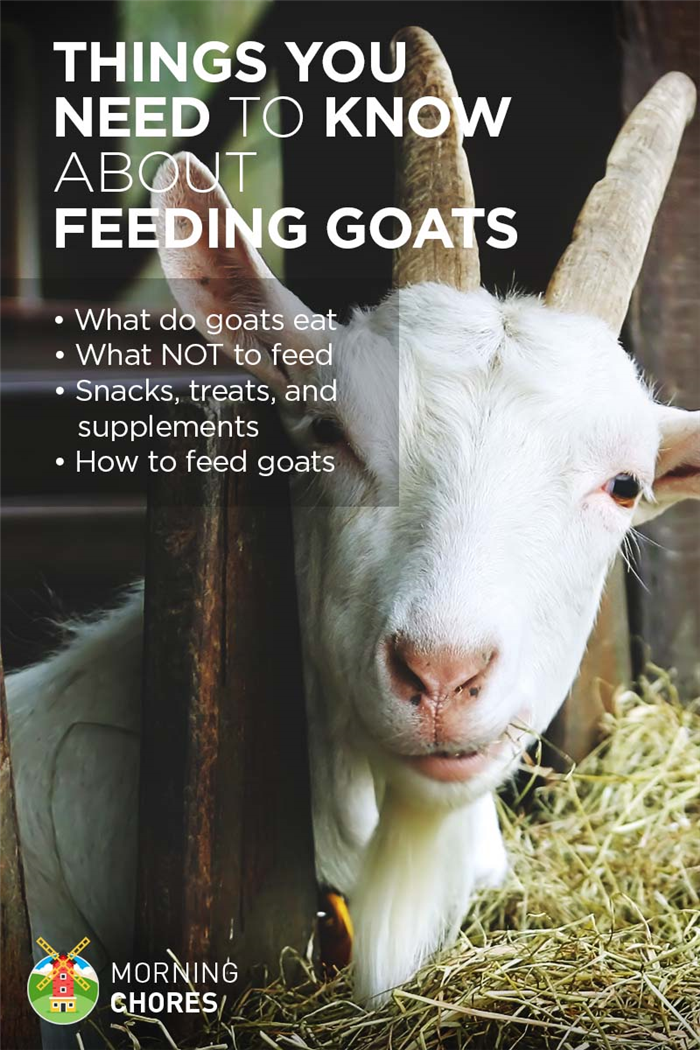
If you buy an item via links on this page, we may earn a commission. Our editorial content is not influenced by commissions. Read the full disclosure.
I have goats and I love them.
If it tells you anything, I have a sticker that reads ‘Goat Mom’ on the back of my truck. Maybe it’s a little embarrassing for my passengers, but I want the world to know that I am a proud goat owner and just how much joy they bring to my day.
That said, today you will learn everything you should know about feeding your goat. Hopefully, this will help you gain a little more knowledge before you bring your 4-legged babies home.
Great, let’s get started.
What to Feed Your Goats
You have probably heard that goats will eat anything.
I’ll be honest; that’s not true in my case.
It doesn’t mean that some people don’t have goats that will eat practically anything. They might be, but mine just won’t.
My pygmy was raised as a forager, so she is a healthier eater. She prefers hay and anything green. Whereas, the person I bought my other goats from raised them on grains, so that is their preference.
I’m going to give you the best feeds I’ve found for goats and feel free to tweak it until you find what works best for your variety.
1. Hay
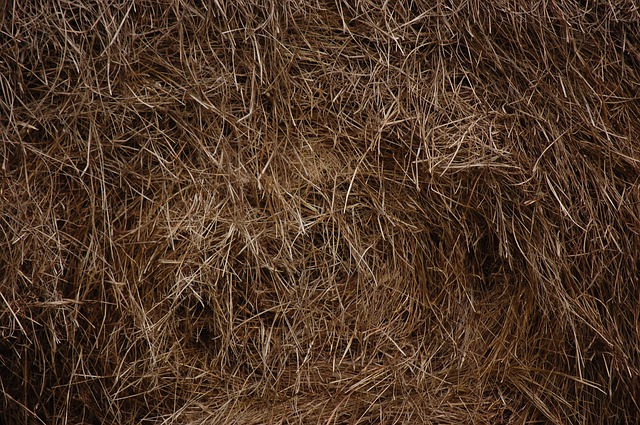
Goats need hay. Especially if they are not foragers.
If you have a pasture, then you’ll only need to give them hay during the times of the year when they can’t graze.
If you don’t raise alfalfa, but you want your goats to get that extra protein, then feed them alfalfa hay twice per day while they forage too.
My goats are not in a foraging situation, yet. They actually have their own lot while I’m working on fencing. A lot of my property is wooded, so I’m actually going to fence in an area for them to help clean up the brush in some of my wooded spots.
In the meantime, I feed them hay free-flowing. I personally only feed them grass hay because it is the most affordable, and they don’t appear to be lacking in any kind of vitamins (as visitors often comment on their beautiful coats.)
Regardless of your goat keeping situation, hay is a must and is the main part of a goat’s diet.
2. Chaffhaye
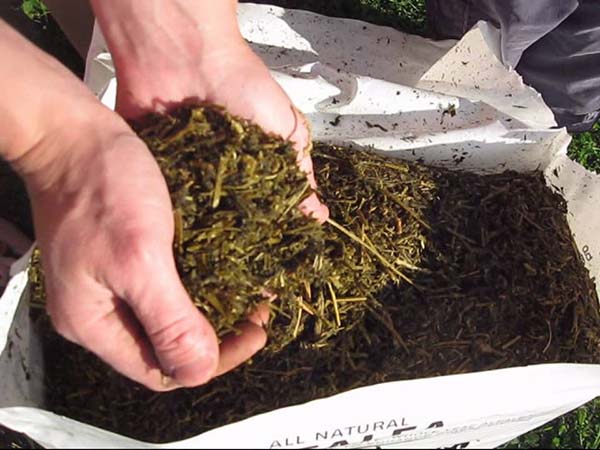
I think I need to look into using this for my goats too.
Chaffhaye is alfalfa or grass that has been cut early. They then cut it up into smaller chunks and spray it with molasses. Then they add a culture of Bacillus Subtillis and vacuum seal it into a 50-pound bag.
The Chaffhaye will ferment while in the bag. It adds good bacteria to the hay which makes it easier for the goats to digest. The fermentation process also adds more nutrients, minerals, and energy to their food.
As you probably already know, the biggest danger in keeping goats is their digestive systems. If they get messed up, they can die very easily.
Anything that adds good bacteria to their gut is a huge bonus.
3. Grains
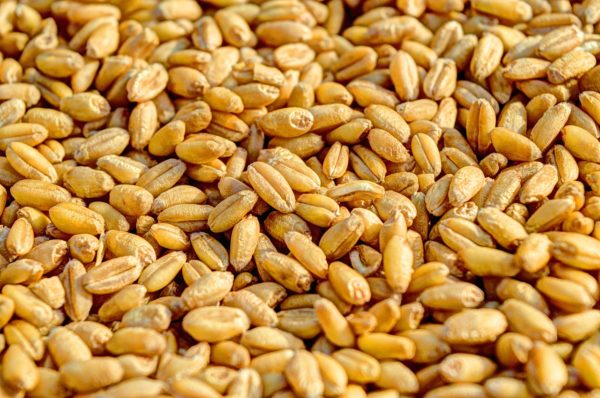
There are 4 different types of grains: whole, pelleted, rolled, and texturized.
Whole grains are the regular unprocessed grains. This is what I feed my goats along with hay. I usually feed them whole corn, but not a whole lot because too many grains are not good for them. I usually give about a cup per adult goat. My kids get half a cup.
Pelleted grains are milled grains or grain byproducts that have then been turned into pellets with a binding agent. If I’m honest, I don’t really care for the pellets. I know many say they are great, and they come medicated.
I am more of a naturalist goat owner. If I can’t pronounce what is in it, I don’t like feeding it to them. However, it is a personal call and many people do feed them pellets. No judgment here if that is what you decide to go with.
Rolled grains are the same as whole grains only they’ve been rolled. If I feed my goats oats then I usually get them rolled. They like oats, it just depends on which store I’m at for that week as to what they get.
Then there are texturized grains. They are similar to rolled only they have other grains mixed with them to add extra nutrients. When I purchase sweet feed from our local feed mill then it is texturized and my goats love it.
Snacks and Treats for Goats
Goats love to snack too. Try a variety of snacks to see which your goats prefer.
Not every goat likes the same snack. One of my goats will eat anything green. While my other goats will completely turn their noses up to most treats.
Here are a few ideas for some acceptable snacks:
1. Sweet Feed
My goats love sweet feed. However, you need to be careful about how much you feed them.
There is no real nutritional value in it, and if you feed them too much of sweet feed, they become junk food junkies. Meaning, if I spoil my goats a little too much, they will wake me up screaming because they have a sweet tooth.
It isn’t much fun. I’ve learned to limit how much of this special treat they get.
It also depends on what store you purchase your sweet feed.
If I buy it from the chain store, there is basically no nutritional value in it whatsoever. However, if I purchase sweet feed from the local feed mill they add extra grains that ups the nutritional value.
2. Human Foods
A variety of human foods are okay to feed your goats. Foods like fruits, dried fruits, veggies, graham crackers, cheerios, Cheetos, and even corn chips.
It is basically at your discretion what you want to try. Just be aware that snacks are just that. Too much of anything isn’t good for them.
3. Weeds
Goats that don’t get to forage especially love weeds.
We are overrun with plantain; we’ll bring it to our goats by the buckets, and they love it. They will be happy to snack on your weeds all day long.
Goats like kudzu as well.
We have a lot of that in my mother-in-law’s woods. You can just chop them out and they’ll make a buffet out of it.
Food Supplement for Goats
Go for it. As long as you make sure to give your goats hay (unless they forage). Supplements don’t replace their food.
However, if you want to switch out grains for other foods or if you want to give them their needed minerals without paying for the store-bought versions there are ways of doing that.
These are your options:
1. Loose minerals
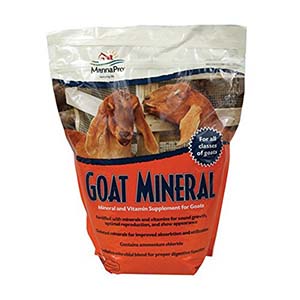
Just like human needs to take multi-vitamins to make sure our bodies get all of the required nutrients, goats need loose minerals for the same purpose.
You can buy them loose or get them a mineral block that they lick.
Either way, they will be happy to eat them, and you are doing your part to raise healthy goats.
2. Baking Soda
I haven’t fed my goats baking soda but after reading the benefits, I’ll be starting now.
Remember how I’ve repeatedly said how sensitive a goat’s digestive system is?
Well, baking soda can help keep things in check. You feed them baking soda freely with their loose minerals and this will help aid their digestion and stop bloat.
3. Beet Pulp
You can buy beet pulp. I looked it up and have not found a recipe for making your own. Though this would be an investment, the benefits are great so you might deem it to be worth the cost.
Beet pulp is high in fiber, protein, and energy. So if your goat gets bored with the average goat feed then switch it up a little bit. They’ll be happier for it.
4. Black Oil Sunflower Seeds
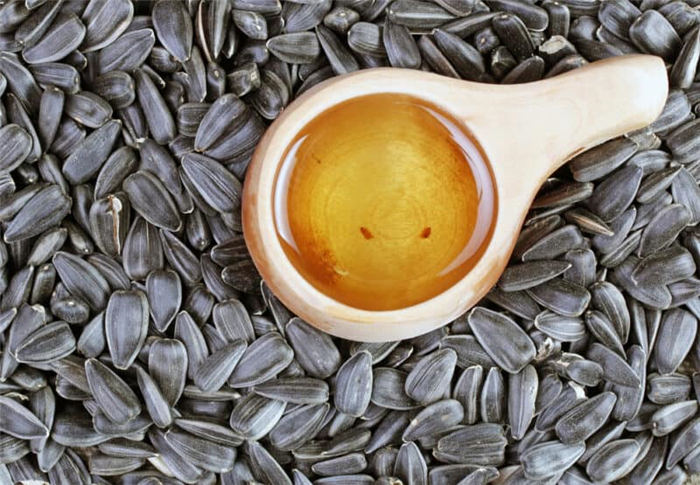
I knew that these were good for my rabbits, but I had no idea all of the benefits they held for goats. Again, another item I will be adding to the list of things to try and feed them.
Black Oil Sunflower Seeds are high in Vitamin E, which helps with goat’s reproductive health and their muscles. They are also high in zinc, iron, and selenium. It will also make their coats shinier and will enrich the fat content in their milk.
You can purchase black oil sunflower seeds if you think you’d like to give them a try.
5. Kelp Meal
Kelp meal is a great source of iodine. Another great benefit of your goats eating Kelp Meal is that it will increase their milk production too.
This would be an extremely helpful supplement for those that raise milking goats. You can buy kelp meal if you are interested.
6. Apple Cider Vinegar
ACV is great for everyone. As a human, I try to take a teaspoon of apple cider vinegar that has mother in it daily because of all of the health benefits.
If we take it for health then why not the goats?
You just add a little to their water every day. It is full of enzymes and minerals that help support a healthy immune system.
If you are interested in giving ACV a try for your goats (or yourself), you can purchase it, or try your hand at making it yourself.
What Should You Not Feed Your Goats?
There are quite a few items you should not feed your goats. Now, I want to mention the ones that are most common to all people no matter what area you live in.
You should never feed your goats these items:
- Avocado
- Azaleas
- Chocolate
- Plants with oxalates such as kale
- Any nightshade vegetable
- Holly trees or bushes
- Lilacs
- Lily of the valley
- Milkweed
- Rhubarb leaves
- Wild cherries
Here is a more in-depth list of items all over the globe that are potentially poisonous to your goat. If in doubt, always Google it.
It is better to be safe than sorry.
How to Feed Your Goats
When it is feeding time around the homestead, it is important that you know how often to feed, how much to feed, and that you have the proper feeding equipment.
Let’s get started on this important task.
When it comes to hay, the proper amounts are 2-4 pounds per goat each day. Chaffhaye is 2 pounds per 100 pounds of body weight.
In reality, if you feed hay freely they’ll eat what they need to, and it won’t hurt them. However, grains are a different story.
If you feed your goats too many grains, it can actually kill them. It is important that you do not feed your adult goats more than 1½ pounds of grain per day. The kids require even less grain than that.
As I said previously, I usually feed each adult goat a cup of grains a day. My kids usually get around half a cup of grains a day.
If your goats forage, then you may or may not need to give them hay 1-2 times a day. You can give them their grains in one setting or two. It is your choice.
My goats do not forage so I feed them all of their goodies one time per day. I will give them little snacks throughout the day sometimes just because I like to hang out with my goats.
The proper equipment is as follows:
1. Hay feeder
You need a hay feeder. Goats will not eat their food once it has been trampled. So be sure to buy or make them a hay feeder.
It will make sure less of your feed goes to waste.
2. Grain Feeder
Your goats will waste grains if it is not in an easily accessible dish. And once those grains hit the ground they are done.
Goats just won’t touch it. Weird, I know, but they won’t. So you can buy them a grain feeder, or you can do as I do.
I use a galvanized tub to feed my goats. If I’m going away on a trip, then I’ll use a sturdy under the bed box to make sure my goats have ample amount of feed while I’m gone.
3. Mineral Feeder
If you are going to feed your goats minerals, then you’ll need a mineral feeder. It will help to stop waste.
You can also go with a mineral block. If so you’ll need a holder for that as well. You can purchase a mineral feeder or a mineral block holder to make giving your goats their minerals that much easier.
4. Waterer
Goats require quite a bit of water. You can purchase a waterer or do as I do. Again, I just use a large galvanized tub. You can also use a rain barrel to save water.
It does the trick, and my goats don’t ever turn it over as the water helps weigh it down. Need another idea for a waterer? Try this one.
Well, my goat friends, that is all I have for you today. I hope this gives you all of the information you needed for your 4-legged goat babies.
What goats (really!) eat
Have you ever heard someone say, “Goats can eat anything”? Although goats do like to explore things with their mouths, this is actually not true – they can be surprisingly picky! Goats get their reputation for eating almost anything because they like to walk around and sample a wide variety of foods, as opposed to grazing a pasture like cows or sheep. Goats will eat hay, grasses, weeds, grain, and sometimes even tree bark! So, what do we actually feed the goats here at Zoo Atlanta?
The main part of a goat’s diet is called roughage. Roughage is usually grass or hay that is high in fiber and has relatively low calories. Because hay is low in calories, goats are designed to eat a lot of it. Here at the Zoo, we will offer the goats hay six or seven times a day, and each goat can eat two to four pounds of food a day! The first chamber in their stomach, the rumen, is full of beneficial bacteria that break down the hay and transform it into fats that the goats can digest. Goats also have three other chambers in their stomachs, and each one plays a role in helping goats to absorb nutrients from their food.
Because a goat’s digestive system is so complex and uniquely adapted for eating hay, we never give the goats human food – sugary foods can stall their digestive process and make them very sick! By making sure that the goats munch on what they are designed to eat, we keep them happy and healthy.
Just like people, goats also need small amounts of vitamins and minerals to help keep their bodies functioning well. Goats (and most other mammals too) need small amounts of salt in their diet as well. If you see white blocks around the petting zoo, don’t be surprised – they are made of salt, and our goats love to lick them! We also help our hooved friends get their vitamins by offering them a powdered mineral mixture made especially for goats.
If a goat had to pick a favorite food, it would probably be grain! Goat grain can be made up of corn, barley, oats and soybeans – it is very high in calories (lots of energy), but low in fiber, which means that too much can make a goat obese. We feed our goats grain as a special treat or when they need to gain some weight to stay healthy. We use premade grain mixture that uses a mixture of corn, soybeans, and oats that our goats think is delicious!
Did I mention that goats enjoy eating leaves and bark? To help the goats get their twig fix, we will give them sticks and branches with the leaves still on them, which we call browse. The goats will eagerly strip the leaves and bark off the branches, practicing their natural foraging behavior that I mentioned earlier. And in case you’re wondering, we get our browse from our awesome Horticulture Team, who get clippings from around the Zoo and bring them to us. If you come by at 11:15 a.m., you might be able to catch some of the goats eating their browse in one of our enrichment demonstrations!
So, next time you visit our petting zoo, remember that the goats don’t eat just anything – they have a fascinating four-chambered stomach designed to eat hay, grain and browse! You can help us keep our goats healthy by never feeding them any human food, but watching and observing as they practice their natural foraging behavior. I look forward to seeing you in the petting zoo soon!
Claire C.
Seasonal Keeper, Ambassador Animals
What do Goats eat – Goats Diet Basics
In general, goats love food variety. Goat is a natural explorer and loves to wander and search for food. The state of wandering and searching for food is strongly related with its well-being. Goat’s natural food is pasture, trees, grapes, hay, fruits and a small quantity of grains. With the term pasture we define a broad range of plant species: grass, clover, alfalfa (Medicago sativa), chicory, legumes, shrubs, young trees etc. The biodiversity of pasture is directly related to the quality of food consumed (more diverse food – better quality). With the term grains we define the seed part of cereals (such as corn) and is a food that the goats used to eat in the wild for centuries, but at very small quantities compared to pasture. Goats have also the ability to stand on their rear feet or climb and eat various tree fruits and vegetation. However, it is not safe to let your goats eat any unidentified plant. Some species of Rhododendron and other ornamental plants (Azalea) and shrubs have been found to be toxic for the goats and may result in life threatening situations after eating even one small leaf. Cabbage, potatoes and tomato leaves have also been reported to be toxic in some cases. In all cases, a future goat owner shall make a research on locally found plants that can be toxic to goats.
Before the 20th century’s prevalence of commercial goat feeders, old farmers used to base their goats’ diet entirely on pasture, corn, hay and some fruits. However, the most common commercial breeds that have been nowadays selected for meat and/or dairy production respond greatly to commercial feeders. In general, the diet of a dairy goat is different to that of a meat goat. As a rule of thumb, meat goats can rely only on pasture, hay and fruits, whereas dairy goats’ diet is usually supplemented with commercial goat feeders, most of which contain a mix of grains. Of course, your field must be able to produce enough diverse pasture most of the year; otherwise you should use commercial feed for all your goats, dairy or not. For example, in many areas where alfalfa and related plant species cannot be grown due to climate, many farmers use commercial alfalfa cubes for goats.
The most common commercial goat feed is mixed pellets and cubes made from corn and oats. A typical commercial feeder for young and lactating goats contain grains and trace minerals to support strong milk production and growth. The most common used ingredients are corn, wheat millrun, soybean meal and sun-dried alfalfa. Keep in mind that grains are necessary only for goats of special needs (young, lactating etc.) and should be put in a goat’s diet slowly and at a small quantity. If you exceed a certain limit, the goat will most probably start having various health problems.
On average, young goats (from 1 until 14 months old) are usually offered 1-2 coffee cups of mixed grains every day according to their weight (read carefully the labels). However, the goal at this age is to encourage them to learn how to browse and search for their food, with or without their mother. They are also offered hay once a day during summer and twice a day during winter. Minerals and herbal supplements are also offered at a moderate quantity. Mature female goats that are dry and not pregnant are usually offered hay twice a day during winter and once a day during summer, while they are free to browse for pasture most of the day. They are also offered baking soda in feeders (baking soda has been reported to help in the digestion). Mature female goats that are pregnant or in the milk side, are offered all the above mentioned plus 2-5 coffee cups of mixed grains per day (depending on the goats weight and milk production – read carefully the labels). Of course, a pregnant or a milking goat does not have the energy to browse all day and search for food, so its diet is usually supplemented with herbal dietary supplements (alfalfa cubes). Mature male goats (bucks) are usually offered all of the above mentioned, apart from grains. Some goat farmers offer a small quantity of grains (1-2 coffee cups) every day, while others feed them just pasture, hay, minerals and some herbal dietary supplements.
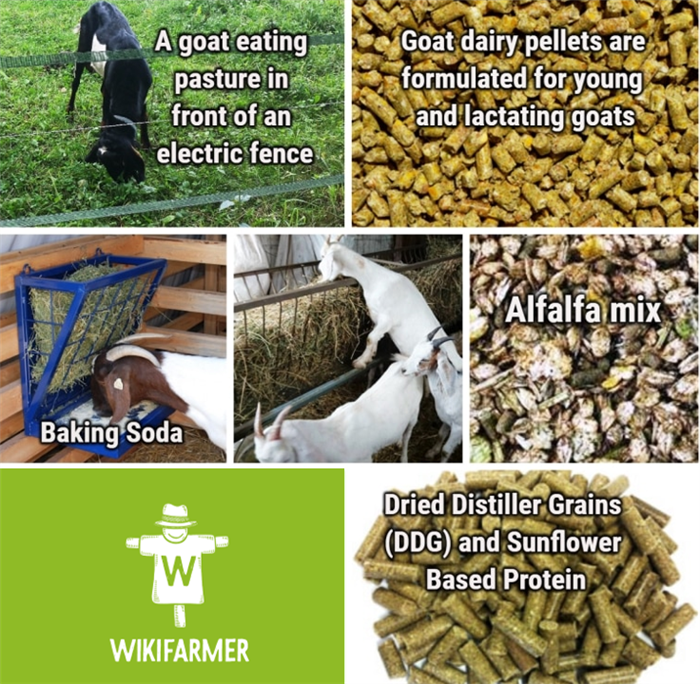
In all cases, goats must have 24 hour access to water inside their shelter. Waterers must also be placed in 2-3 distant spots of your field. You should change the water at least once a day. You can also put an immovable bowl inside their shelter, where you can put apples, carrots and bananas. Finally, salt blocks (which function as mineral supplements) are added to contemporary goat feed programs.
Offering kitchen waste to goats is a controversial issue. Many goat farmers offer a small quantity of fruit and vegetable waste (fruit peels, vegetable skins) or a small slice of bread and their goats seem to love it. However, this kind of food shall be given in small quantities as a treat, rather than as a base of goats diet.
An inexperienced farmer shall first consult local experts, local veterinarian and/or agronomist in order to form a rational annual feed program. In many cases, the flora of the region and the weather conditions are important parameters of the final equation. Keep in mind that any changes in the goats’ diet should happen gradually, otherwise the animals will suffer from diarrhea and other disorders. You can also read more on Plants Poisonous to Goats.
You can enrich this article by leaving a comment or photo of your goats’ feeders, doses and details on pasture.
4.) How to feed Goats
Do you have experience in Goat Farming? Please share your experience, methods and practices in the comments below. All the content you add will be soon reviewed by our agronomists. Once approved, it will be added to Wikifarmer.com and it will influence positively thousands of new and experienced farmers across the world.
This post is also available in: Español Français Deutsch Nederlands हिन्दी العربية Türkçe 简体中文 Русский Italiano Ελληνικά Português Tiếng Việt Indonesia 한국어
